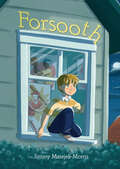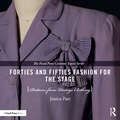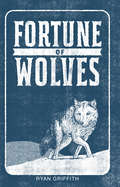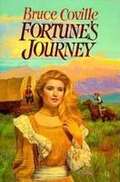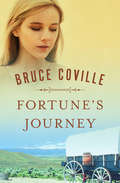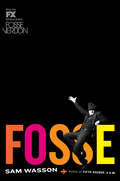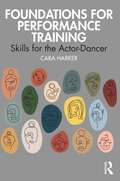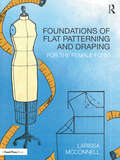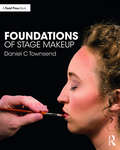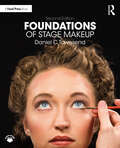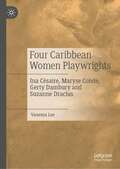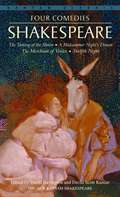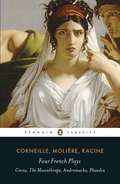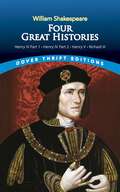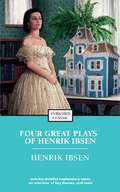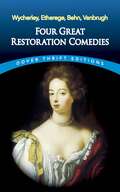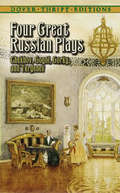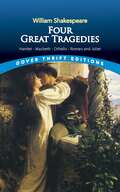- Table View
- List View
Forsooth
by Jimmy Matejek-MorrisThirteen-year-old Calvin knows he's destined to be a star. . . if he can just stop making embarrassing mistakes onstage, like getting stuck on a single line—"Forsooth!"—and then falling off the stage during the school play. The summer after seventh grade, he's hoping for a fresh start. All he has to do is prove himself as an actor and fix the awkwardness with his friends that started after the play. But nothing's going according to plan. His parents don't get his love of performing. His best friend is moving on without him. And he might have a crush that could change everything. Surrounded by drama on all sides, Calvin will have to go off script if he's going to be a real friend and be true to himself.
Forties and Fifties Fashion for the Stage: Patterns from Vintage Clothing (The Focal Press Costume Topics Series)
by Jessica ParrForties and Fifties Fashion for the Stage: with Patterns from Vintage Clothing provides instruction on how to recreate fashion from the 1940s and 1950s that withstands the vigorous demands of theatrical stage use. This book provides historical context for the clothing and features authentic patterns taken from real vintage pieces. Forties and Fifties Fashion for the Stage demonstrates how to construct a durable costume from scratch, and how to adjust patterns to fit an individual’s measurements. The book also contains a number of "How To Fake It" chapters with advice on thrifting and how to create period fashion using today’s clothing. Both men’s and women’s fashions and patterns are featured, including formal and casual wear.
Fortune of Wolves
by Ryan GriffithWhat would it feel like if the world emptied out? Lowell Garrish has lost everything—his parents, his grandma, the music the waves make on the shore in Nova Scotia. Desperate to hold on to real sound, Lowell sets off on a road trip across Canada with a tape recorder, capturing something from every person he meets and his observations along the way. But as he drives, strange occurrences and mass disappearances imply that something terrible is happening, and Lowell begins to realize that time for humanity may be running out. Written as transcriptions of now-disintegrated cassette tapes, and meant to be read in random sequence, this engrossing apocalyptic adventure is a self-guided tour into the belly of a deafening silence.
Fortune's Journey
by Bruce CovilleSixteen-year-old Fortune Plunkett faces many challenges on an overland journey to California in 1853 with the acting company that she inherited from her father.
Fortune's Journey
by Bruce CovilleOn the Oregon trail, a theater troupe strives to reach California After months in the cramped confines of a Conestoga wagon, Fortune Plunkett is dreaming of the life she left behind in Charleston. It was her father's dream to lead his band of actors to California, but he died on the trail. Fortune's only inheritance is a trunk of old costumes, a handful of plays, and a passionate drive to reach the Pacific Ocean, no matter what hardships she might endure along the way. At the time of her father's death, the actors were heading toward an engagement in the little town of Busted Heights--a place that held a fascination for Fortune's father that he never explained. There Fortune meets the greenhorn Jamie Halleck, a naive young man who convinces her to let him join the group. With Jamie onboard, they hit the trail again, ready to reach California and find their destiny. This ebook features an illustrated personal history of Bruce Coville including rare images from the author's collection.
Fosse
by Sam WassonFrom “a smart and savvy reporter,” a biography of the award-winning performer and director that “abounds with colorful firsthand tales” (Janet Maslin, New York Times).Now the FX limited series Fosse/Verdon starring Sam Rockwell and Michelle Williams with Lin-Manuel Miranda executive producing.The only person ever to win Oscar, Emmy, and Tony awards in the same year, Bob Fosse revolutionized nearly every facet of American entertainment. His signature style would influence generations of performing artists. Yet in spite of Fosse’s innumerable achievements—including Cabaret, Pippin, All That Jazz, and Chicago, one of the longest-running Broadway musicals ever—his offstage life was shadowed by deep wounds and insatiable appetites.To craft this richly detailed account, best-selling author Sam Wasson has drawn on a wealth of unpublished material and hundreds of sources: friends, enemies, lovers, and collaborators, many of them speaking publicly about Fosse for the first time. With propulsive energy and stylish prose, Fosse is the definitive biography of one of Broadway and Hollywood’s most complex and dynamic icons.An NPR Best Book of the Year“Fascinating.” —Wall Street Journal“Spellbinding.” —Entertainment Weekly“Impeccably researched.” —Vanity Fair‘‘Scintillating.’’ —Publishers Weekly, starred review“Powerfully told.’’ —Paul Hendrickson, author of Hemingway’s Boat: Everything He Loved in Life, and Lost“Highly recommended for theater or movie aficionados, aspiring performers, and fans of engrossing biography.’’ —Library Journal, starred review‘‘Lushly researched . . . moving and memorable. . . . Graceful prose creates a richly detailed and poignant portrait.’’ —Kirkus Reviews (starred review) “A pure joy to read, cover to cover; you read it not merely for Fosse’s story, but also for Wasson’s inventive way of telling it.” —Booklist, starred review
Found in Translation
by J. Michael WaltonIn considering the practice and theory of translating plays into English from Classical Greek from a theatrical perspective, Found in Translation also addresses wider issues of transferring any piece of theatre from a source into a target language. The history of translating classical tragedy and comedy, here fully investigated for the first time, demonstrates how through the ages translators have, wittingly or unwittingly, appropriated Greek plays and made them reflect socio-political concerns of their own era. Chapters are devoted to topics including verse and prose, mask and non-verbal language, stage directions and subtext and translating the comic. Among the plays discussed as 'case studies' are Aeschylus' Agamemnon, Sophocles' Oedipus Tyrannus and Euripides' Medea and Alcestis. The book concludes with a consideration of the boundaries between 'translation' and 'adaptation', followed by an Appendix of every translation of Greek tragedy and comedy into English from the 1550s to the present day.
Found Life: Poems, Stories, Comics, a Play, and an Interview (Russian Library)
by Linor GoralikOne of the first Russian writers to make a name for herself on the Internet, Linor Goralik writes conversational short works that conjure the absurd in all its forms, reflecting post-Soviet life and daily universals. Her mastery of the minimal, including a wide range of experiments in different forms of micro-prose, is on full display in this collection of poems, stories, comics, a play, and an interview, here translated for the first time. In Found Life, speech, condensed to the extreme, captures a vivid picture of fleeting interactions in a quickly moving world. Goralik's works evoke an unconventional palette of moods and atmospheres—slight doubt, subtle sadness, vague unease—through accumulation of unexpected details and command over colloquial language. While calling up a range of voices, her works are marked by a distinct voice, simultaneously slightly naïve and deeply ironic. She is a keen observer of the female condition, recounting gendered tribulations with awareness and amusement. From spiritual rabbits and biblical zoos to poems about loss and comics about poetry, Goralik's colorful language and pervasive dark comedy capture the heights of ridiculousness and the depths of grief.
Foundations for Performance Training: Skills for the Actor-Dancer
by Cara HarkerFoundations for Performance Training: Skills for the Actor-Dancer explores the physical, emotional, theoretical, and practical components of performance training in order to equip readers with the tools needed to successfully advance in their development as artists and entertainers. Each chapter provides a fresh perspective on subjects that students of acting and dance courses encounter throughout their training as performing artists. Topics include: Equity, diversity, and inclusion in performance Mind/body conditioning for training, rehearsal, and performance Developing stage presence and spatial awareness Cultivating motivation and intention in performance Expanding repertoire and broadening skillset for performance Auditioning for film and stage Developing theatrical productions This book also offers experiential exercises, journal writing prompts, and assignments to engage readers, enrich their learning experience, and deepen their exploration of the material described in each chapter. Readers will grow as performing artists as they analyze the principles of both acting and dance and discover how deeply the two art forms are intertwined. An excellent resource for students of acting, musical theatre, and dance courses, Foundations for Performance Training encourages a strong foundation in creative analysis, technique, artistic expression, and self-care to cultivate excellence in performance.
Foundations for Performance Training: Skills for the Actor-Dancer
by Cara HarkerFoundations for Performance Training: Skills for the Actor-Dancer explores the physical, emotional, theoretical, and practical components of performance training in order to equip readers with the tools needed to successfully advance in their development as artists and entertainers.Each chapter provides a fresh perspective on subjects that students of acting and dance courses encounter throughout their training as performing artists. Topics include: Equity, diversity, and inclusion in performance Mind/body conditioning for training, rehearsal, and performance Developing stage presence and spatial awareness Cultivating motivation and intention in performance Expanding repertoire and broadening skillset for performance Auditioning for film and stage Developing theatrical productions This book also offers experiential exercises, journal writing prompts, and assignments to engage readers, enrich their learning experience, and deepen their exploration of the material described in each chapter. Readers will grow as performing artists as they analyze the principles of both acting and dance and discover how deeply the two art forms are intertwined.An excellent resource for students of acting, musical theatre, and dance courses, Foundations for Performance Training encourages a strong foundation in creative analysis, technique, artistic expression, and self-care to cultivate excellence in performance.
Foundations of Flat Patterning and Draping: For the Female Form
by Larissa McConnellFoundations of Flat Patterning and Draping: For the Female Form provides the foundational tools necessary for success in the techniques of flat patterning and draping clothes and costumes. This book begins with the basics of taking measurements, preparing the fabric for draping, and preparing the dress form. The following chapters explore flat patterning and draping practices for bodices, skirts, pants, dresses, sleeves, collars, cuffs, and facings through detailed step-by-step instructions, checklists, and numerous diagrams. The bodice drafting instructions in this book, specifically, are a new method that accommodates all bust and cup sizes. There are instructions for small and large cup sizes allowing for a fit that does not gap at the armscye as typically happens with previous patterning methods, and additional sections for bodices and sleeves and how to manipulate them to create alternate looks. The techniques in this book generalize across sizes and shapes making it universally applicable for the student technician, as well as the person the garment is being developed for. Each method of drafting and draping has been class-tested and proven to produce well-fitting garments. Presented in an accessible format with clear instructions and detailed illustrations, this book is well suited for use as a textbook for the undergraduate college instructor teaching costuming or fashion, as well as for the student or individual learning on their own in theatre, film, or fashion industries.
Foundations of Stage Makeup
by Daniel C TownsendFoundations of Stage Makeup is a comprehensive exploration into the creative world of stage makeup. Step-by-step makeup applications paired with textual content create an enriching experience for future performers and makeup artists. Students will learn relevant history, color theory, makeup sanitation processes, and the use of light and shadow to engage in discussions about the aspects of professional makeup. Those foundations are then paired with a semester’s-worth of descriptive, engaging makeup applications. Old age makeup, blocking out eyebrows, gory burns, and creating fantastical creatures are just a few of the rewarding techniques found in Foundations of Stage Makeup. The book is complemented by an eResource page featuring makeup tutorials and an instructor’s manual with example assignments and tips to teaching each chapter.
Foundations of Stage Makeup
by Daniel C TownsendFoundations of Stage Makeup, Second Edition is a comprehensive exploration into the creative world of stage makeup.Step-by-step makeup applications paired with textual content create an enriching experience for future performers and makeup artists. Students will learn relevant history, color theory, makeup sanitation processes, and the use of light and shadow to engage in discussions about the aspects of professional makeup. Those foundations are then paired with a semester’s worth of descriptive, engaging makeup applications. Old age makeup, blocking out eyebrows, gory burns, and creating fantastical creatures are just a few of the rewarding techniques found in Foundations of Stage Makeup. This new edition features new chapters on basic prosthetic appliction and animal makeup, new information on historical makeup use, updates pertaining to industry-wide standards and practices, new images, and updated supporting material.This is the perfect book to use in Introduction to Stage Makeup courses.Foundations of Stage Makeup is complemented by makeup tutorials, a printable makeup chart, and an instructor’s manual with example assignments and tips to teaching each chapter, available at www.routledge.com/9781032664200.
Four Baboons Adoring the Sun and Other Plays
by John GuareThe setting is Sicily, the island where the gods once spent their holidays. The principals are a newlywed couple in their forties, who hope to meld the children of their previous marriages into a brave, new, postnuclear family. But in John Guare's vastly original and eerily beautiful new play, any family may be reconstructed as a tragic pantheon, enacting passion as ancient as the strata of an archaeological dig and as catastrophic as an earthquake.
Four Caribbean Women Playwrights: Ina Césaire, Maryse Condé, Gerty Dambury and Suzanne Dracius
by Vanessa LeeFour Caribbean Women Playwrights aims to expand Caribbean and postcolonial studies beyond fiction and poetry by bringing to the fore innovative women playwrights from the French Caribbean: Ina Césaire, Maryse Condé, Gerty Dambury, Suzanne Dracius. Focussing on the significance of these women writers to the French and French Caribbean cultural scenes, the author illustrates how their work participates in global trends within postcolonial theatre. The playwrights discussed here all address socio-political issues, gender stereotypes, and the traumatic slave and colonial pasts of the Caribbean people. Investigating a range of plays from the 1980s to the early 2010s, including some works that have not yet featured in academic studies of Caribbean theatre, and applying theories of postcolonial theatre and local Caribbean theatre criticism, Four Caribbean Women Playwrights should appeal to scholars and students in the Humanities, and to all those interested in the postcolonial, the Caribbean, and contemporary theatre.
Four Comedies: The Braggart Soldier; The Brothers Menaechmus; The Haunted House; The Pot of Gold (Oxford World's Classics)
by Plautus Erich SegalPlautus was the single greatest influence on Western comedy. In fact, Shakespeare's Comedy of Errors and Moliere's the Miser are two subsequent classics directly based on Plautine originals. Plautus himself borrowed from the Greeks, but his jokes, rapid dialogue, bawdy humor, and irreverent characterizations are the original work of an undisputed genius. The comedies printed here show him at his best, and Professor Segal's translations keep their fast, rollicking pace intact, making these the most readable and actable versions available. This volume includes, The Braggart Soldier, e Brothers Menaechmus, The Haunted House, and The Pot of Gold.
Four Comedies: The Taming of the Shrew, A Midsummer Night's Dream, The Merchant of Venice, Twel fth Night
by William Shakespeare David Bevington David Scott KastanThe Taming of the ShrewRobust and bawdy, The Taming of the Shrew captivates audiences with outrageous humor as Katharina, the shrew, engages in a contest of wills-and love-with her bridegroom, Petruchio, in a comedy of unmatched theatrical brilliance, filled with visual gags and witty repartee. A Midsummer Night's DreamFairy magic, love spells, and an enchanted wood turn the mismatched rivalries of four young lovers into a marvelous mix-up of desire and enchantment, all touched by Shakespeare's inimitable vision of the intriguing relationship between dreams and the waking world.The Merchant of VeniceThis dark comedy of love and money contains one of the truly mythic figures in literature-Shylock, the Jewish moneylender. The "pound of flesh" he demands as payment of Antonio's debt has become a universal metaphor for vengeance. Here, pathos and farce combine with moral complexity and romantic entanglements, to display the extraordinary power and range of Shakespeare at his best.Twelfth NightSet in a topsy-turvy world like a holiday revel, this comedy juxtaposes a romantic plot involving separated twins and mistaken identity with a more satiric one about the humiliation of a pompous killjoy. The hilarity is touched with melancholy, and the play ends, not with laughter, but with a clown's plaintive song.Each Edition Includes:* Comprehensive explanatory notes * Vivid introductions and the most up-to-date scholarship * Clear, modernized spelling and punctuation, enabling contemporary readers to understand the Elizabethan English* Completely updated, detailed bibliographies and performance histories * An interpretive essay on film adaptations of the play, along with an extensive filmographyFrom the Paperback edition.
Four French Plays: Cinna, The Misanthrope, Andromache, Phaedra
by Jean RacineThe 'greatest hits' of French classical theatre, in vivid and acclaimed new Penguin translations by John Edmunds and with editorial apparatus by Joseph Harris.The plays in this volume - Cinna, The Misanthrope, Andromache and Phaedra - span only thirty-seven years, but make up the defining period of French theatre. In Corneille's Cinna (1640), absolute power is explored in ancient Rome, while Molière's The Misanthrope (1666), the only comedy in this collection, sees its anti-hero outcast for his refusal to conform to social conventions. Here also are two key plays by Racine: Andromache (1667), recounting the tragedy of Hector's widow after the Trojan War, and Phaedre (1677), showing a mother crossing the bounds of love with her son.This translation of Phaedra was originally broadcast on Radio Three with a cast including Prunella Scales and Timothy West, and was praised by playwright Harold Pinter. This is the first time it has been published. The edition also includes an introduction by Joseph Harris, genealogical tables, pronunciation guides, critiques and prefaces, as well as a chronology and suggested further reading.After a varied career as an actor, teacher, and BBC TV national newsreader, John Edmunds became the founder-director of Aberystwyth University's department of Theatre, Film and Television Studies. Joseph Harris is Senior Lecturer at Royal Holloway, University of London and author of Hidden Agendas: Cross-Dressing in Seventeenth-Century France (2005).
Four Great Histories: Henry IV Part I, Henry IV Part II, Henry V, and Richard III (Dover Thrift Editions Ser.)
by William ShakespeareAmong the most studied, read, and admired works in world literature, Shakespeare's histories are unmatched for their dramatic brilliance, beauty of language, and profundity of thought. This convenient and affordable volume -- ideal for students and lovers of literature -- features four of the playwright's greatest historical works:Henry IV, Part 1 masterfully combines comedy and historic events in fifteenth-century England while chronicling the rebellion within Henry's kingdom and portraying events in the life of the profligate young Prince Hal Henry IV, Part II, highlighted by spectacular battles and tender love scenes, witnesses Hal's maturation and the development of his leadership abilities Henry V explores the means by which the "ideal monarch" invades France, wins at Agincourt, and claims the French throne Richard III follows the scheming Duke of Gloucester as he systematically exterminates all those who thwart his plans to succeed to the English throne
Four Great Plays by Henrik Ibsen
by Henrik IbsenGhosts—The startling portrayal of a family destroyed by disease and infidelity. <p><p>The Wild Duck—A poignant drama of lost illusions. <p><p>An Enemy Of The People—Ibsen’s vigorous attack on public opinion. <p><p>And A Doll's House—The play that scandalized the Victorian world with its unsparing views of love and marriage, featuring one of the most controversial heroines—and one of the most famous exists—in the literature of the stage.
Four Great Plays of Henrik Ibsen: A Doll's House, The Wild Duck, Hedda Gabler, The M (Enriched Classics)
by Henrick IbsenEnduring Liturature Illuminated by Practical Scholarship Four of the most popular and profound works from the playwright known as the "father of modern theater." This Enriched Classic Edition includes: • A concise introduction that gives readers important background information • A chronology of the author's life and work • A timeline of significant events that provides the book's historical context • An outline of key themes and plot points to help readers form their own interpretations • Detailed explanatory notes • Critical analysis, including contemporary and modern perspectives on the work • Discussion questions to promote lively classroom and book group interaction • A list of recommended related books and films to broaden the reader's experience Enriched Classics offer readers affordable editions of great works of literature enhanced by helpful notes and insightful commentary. The scholarship provided in Enriched Classics enables readers to appreciate, understand, and enjoy the world's finest books to their full potential. Series edited by Cynthia Brantley Johnson
Four Great Restoration Comedies (Dover Thrift Editions Ser.)
by William WycherleyWhen England's theaters reopened in 1660, 18 years after being closed by an act of Parliament, audiences embraced the witty and satirical dialogue spoken by "plain folks" characters--it was a new era in drama. The four comedy classics featured in this one convenient collection are typical of the works popularized during one of the most exciting and innovative periods in English theater.Brimming with bawdy and satirical comedies and rampant with notorious womanizers, amorous adventure, and marital discord are works by William Wycherley (The Country Wife), Sir George Etherege (The Man of Mode), Aphra Behn (The Rover), and Sir John Vanbrugh (The Relapse).
Four Great Russian Plays (Dover Thrift Editions: Plays)
by Anton ChekhovFrom the golden age of Russian theater: masterpieces by four great writers. Gogol's The Inspector General (translated by John L. Seymour and George R. Noyes) skewers the stupidity and corruptibility of provincial officials. Chekhov's The Cherry Orchard (translator anonymous) brilliantly depicts the passing of the semifeudal social order. The Lower Depths by Gorky (translated by Jennie Covan) paints a grim picture of society on the eve of the Russian Revolution; and Turgenev's A Month in the Country (translated by Constance Garnett) explores the absurdity of romantic love.
Four Great Tragedies: Hamlet, Macbeth, Othello, and Romeo and Juliet (Dover Thrift Editions: Plays)
by William ShakespeareAmong the most studied, most read, and most admired works in world literature, the tragedies of Shakespeare constitute a body of work unrivaled in dramatic brilliance, beauty of language, and profundity of thought. This convenient and affordable volume -- ideal for students and all lovers of literature -- features four of the playwright's greatest works: Hamlet, the revenge drama centering on the introspective Prince of Denmark -- one of literature's most discussed and contentious characters, and the role that every actor longs to play; Macbeth, otherwise known as "The Scottish Play," concerning a nobleman's overweening ambition; Othello, in which a gallant soldier and loving husband is undone by jealousy; and Romeo and Juliet, the timeless tale of the young lovers whose names are synonymous with star-crossed romance. Includes 2 selections from the Common Core State Standards Initiative: Hamlet and Macbeth.
